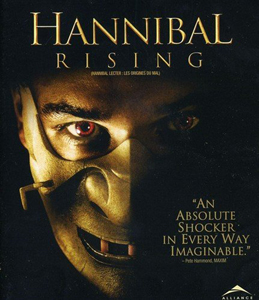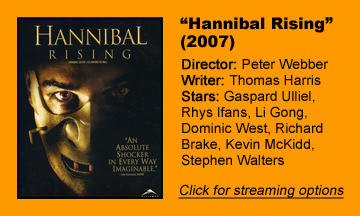To mark the 40th anniversary of author Thomas Harris’ invention of Hannibal Lecter and the 30th anniversary of “The Silence of the Lambs” – the only horror film to win Best Picture – we’re looking back at the four books and five films of the Hannibal Lecter series over nine Frightening Fridays. Finishing it up is the fifth film, “Hannibal Rising” (2007):
A faithful adaptation
As I’ve discovered in this flashback series, all of the “Hannibal” films respect their source material – and that especially comes as no surprise in “Hannibal Rising,” which comes from a prequel novel specifically written with a movie in mind. Indeed, Harris also writes the screenplay (his only such credit) and makes only minor changes.
I found the book jarring, as I didn’t expect Harris to go all the way back to Hannibal’s childhood, but I was prepared for it in the movie and became thoroughly engrossed in director Peter Webber’s film.
The Eastern Europe and French settings, the twilight cinematography and the elegantly dark score all washed over me.
Fine young Hannibal
But especially impressive is the titular turn by Gaspard Ulliel, who is initially a presence and eventually a performer. I assume his casting was criticized at the time because he obviously won’t age into someone who looks like Anthony Hopkins.
But my mind kept going to Mads Mikkelsen of the “Hannibal” TV series. They are both tall with strong cheekbones, and they radiate menace – Ulliel more so, but of course Hannibal will mellow and learn to become more culturally refined as he ages.
The novel now reads like a simplistic novelization after seeing the actors bring the characters to life. Hannibal’s refinement comes from Li Gong’s Lady Murasaki, who holds onto her Japanese heritage in post-WWII France. This means both the calming and the violent aspects, which alternately come out in Hannibal, a wonderful sketch artist and also a creative vengeance-killer.
Also caught in the middle is Dominic West’s Inspector Popil, who knows Hannibal is hunting war criminals yet promises he will arrest Hannibal if he murders one of them in France.
A sympathetic future villain
I wasn’t as troubled as Murasaki or Popil, and that’s “Hannibal Rising’s” intent. It’s heartbreaking to see young Hannibal (Aaran Thomas) and his sister, Mischa (Helena-Lia Tachovská), lose their parents when the war comes to Lithuania. Tachovská particularly looks terrified when the cannibals come knocking. As he seeks revenge, Hannibal is utterly sympathetic.
The cannibals aren’t cartoons, though, even if Rhys Ifans, Richard Brake, Kevin McKidd, Stephen Walters, Ivan Marevich and Goran Kostic make for a nasty-looking bunch. After they merge back into civilization, some have innocent-enough jobs such as chefs, others are working for the state apparatus currently in power. But when they plead to Hannibal that they ate his sister out of desperation, they aren’t lying.
So when Hannibal kills them, we feel a little bit bad for the villains – something we have to grapple with to the end of “Rising” … and beyond, if we’re starting here and moving forward chronologically. Harris and Webber, to their credit, don’t offer us any relief from that subtle unease.

Indeed, they showcase gleefully creative killing methods while being careful not to upstage the kills from later films, as there should be a progression. We’re almost in Hannibal’s shoes in this film, but that’s the point.
A revenge procedural
If I have a criticism of “Rising,” it’s that the narrative is not surprising (except perhaps for one late revelation that in retrospect makes perfect sense); it’s a revenge procedural. Partly that’s because I had read the book, partly because Harris doesn’t have any tricks up his sleeve about Hannibal’s background.
I suspect the harsher critics of this film wanted either surprises or a backstory that included the first Will Graham meeting (an oversight TV’s “Hannibal” would later make up for).
But Harris is interested in showing how Hannibal becomes a sociopath, a doctor, an artist, a sophisticate and a cannibal. “Rising” does that, especially in film form, with its elegant stylings that smooth the novel’s blunter edge. It checks the boxes but not in a way where it’s obviously checking boxes.
I think as time goes by, “Hannibal Rising” will be more appreciated as a strong backstory of Hannibal Lecter.


